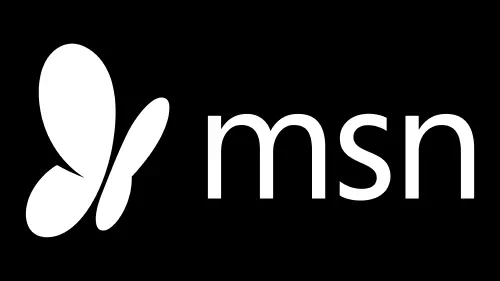9 ChatGPT Prompts for College Students: Research, Planning, Writing, and Studying

Time to turn your brain back on.
We’re back in school and almost immediately we’re submerged in the first semester. You’re slammed with the syllabus for every class, a list of future writing assignments, and an overwhelming amount of reading. Semester projects are around the corner and you haven’t even unpacked everything yet.
What’s different about this year? ChatGPT.
Another message. There was absolutely no need for this bullshit and now all these students are suffering. These tools need to be banned. pic.twitter.com/LygrO9hPmx
— @[email protected] on Mastodon (@timnitGebru) August 22, 2023
Sure, it’s been around since the end of 2022, but now your college most likely has policies in place that either ban it completely or embrace it. Either way, you know there’s value for your educational experience. You just need to use it in a way that doesn’t get you tossed or mess up your studies.
Nobody wants to get kicked out of school for using ChatGPT.
And the worst part about it? These tools can’t even accurately detect what’s definitively written by AI. OpenAI removed its own detection tool because it’s not reliable.
Check out our take on why you can’t trust generative AI detection tools.
But there are ways to ethically and responsibly use generative AI for your assignments and a variety of important ways that you can use the tool beyond assignment writing.
Brainstorming, project planning, creating study guides, and translating those dense-as-hell texts that you’re required to read into real-person language.
ChatGPT: IYKYK (What you need to know) #
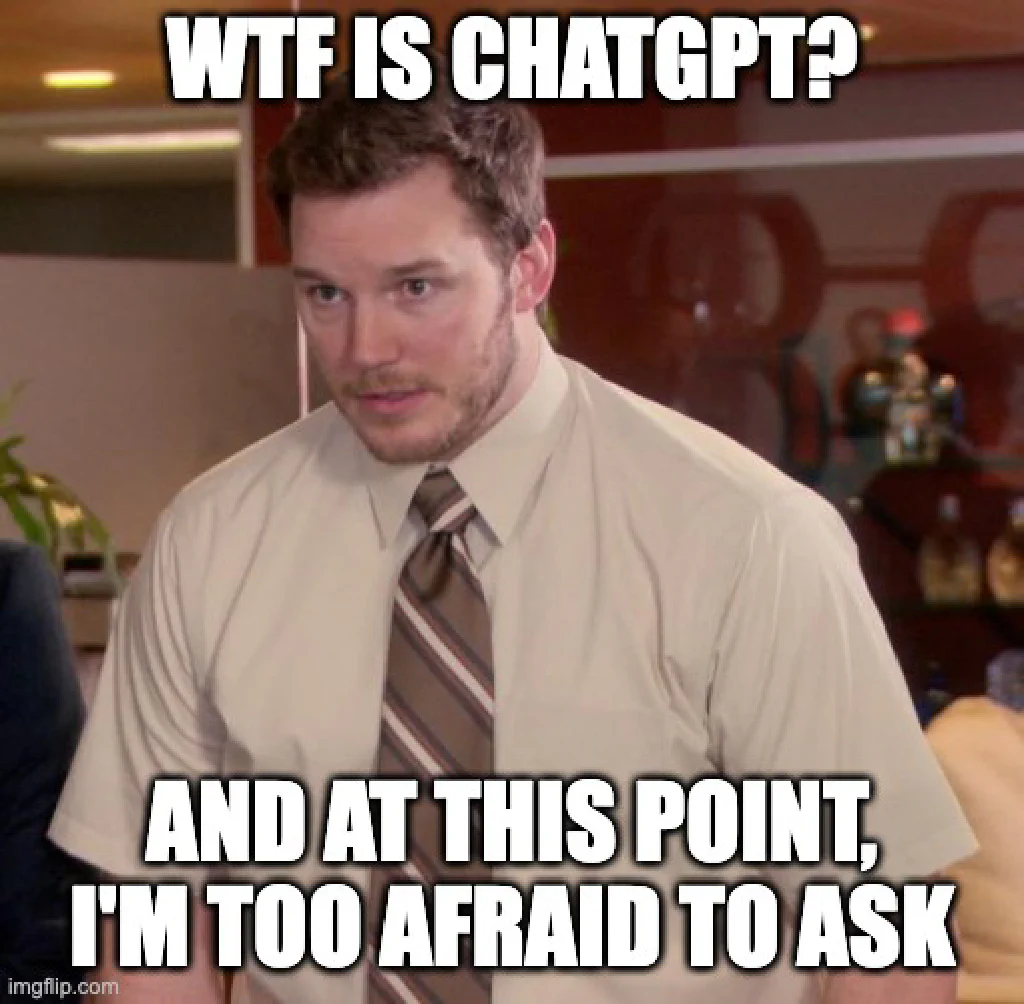
For those of you who are too afraid to ask at this point, ChatGPT is essentially like having a super-knowledgeable friend in your computer. It’s a product of AI research by OpenAI, and it’s designed to understand and generate human-like text based on the input it gets. Think of it as a chatbot, but on some serious academic steroids.
So, whether you’re diving into a tough subject, brainstorming for a project, or just needing some clarity on a topic, ChatGPT is like that study aid that’s always there with some personal insights. More helpful than the internet, because of the personalized insights.
Why Students Are Turning to ChatGPT for Assistance #
So why are your friends and classmates turning to ChatGPT?
The old way: You cram for exams. You rewrite your papers millions of times. You call up friends and ask them if they understood the reading and get left with more questions than answers.
The new way: You have ChatGPT map out your studying. ChatGPT explains things in terms a college person can actually understand. You don’t have to get embarrassed asking for help. You rewrite your assignments into something that you can be
And that’s where technology, specifically AI chatbots like ChatGPT, comes into the picture. Using ChatGPT isn’t about getting good grades. It’s about learning efficiently. It’s leveraging technology (like you’ll need to in the real world). Most of all, it’s about critical thinking, problem-solving, and communicating effectively.
Here are some of the ways that it can give you an edge in your studies.
- An Always Accessibly Study Aid
We’ve all been there – it’s 2 a.m., there’s a burning question in our minds, and everyone we could ask is fast asleep. But ChatGPT? It’s always up for a conversation, whether it’s early morning or late at night. Say goodbye to the constraints of traditional tutors or study group timings.
- Tailored Responses for Individual Needs
Every student is unique, and so are their queries. ChatGPT can provide answers that are specifically tailored to individual questions. Whether you’re struggling with a complex framework or a philosophical question, ChatGPT tries its best to cater to your specific needs.
- Breaking Down Complex Concepts
Some topics just feel like they’re written in another language. When textbooks and class notes fail to make things clear, ChatGPT can help break down these tricky subjects into more digestible chunks, often providing analogies or simpler explanations.
- An Excellent Tool for Language Learners
For those mastering a new language, ChatGPT can be a helpful companion. From refining grammar to expanding vocabulary, it offers real-time feedback, allowing students to practice and improve their language skills.
- Cost-Efficient Learning
Private tutors and extra classes can burn a hole in the pocket. While ChatGPT isn’t a replacement for human educators, it certainly offers a cost-effective supplement to traditional learning resources.
- It’s Non-Judgmental
Ever felt shy or embarrassed to ask a ‘silly’ question in class? We’ve all been there. With ChatGPT, students can freely ask any question without the fear of judgment. After all, AI doesn’t chuckle.
While it’s essential to balance technology use and ensure academic integrity, there’s no denying that ChatGPT offers invaluable support to curious minds everywhere. So, next time you’re stuck or just need a quick chat about your studies, you know where to turn.
How to Efficiently Use ChatGPT for School #
So what can you do with ChatGPT that isn’t cheating, improves your learning, and helps get things done?
Assignments pile up, new topics seem daunting, and sometimes, you just wish for a bit of clarity amidst the chaos. That’s where ChatGPT can swoop in to make life a tad easier.
Think of it like this: you’re sifting through research, but some concepts are just… tricky. Instead of searching the web for hours, you could just pop a question to ChatGPT. It’s like having a chat with a well-informed friend who’s got insights on a vast range of topics.
Beyond just understanding content, it’s also about refining your work. Say you’re drafting an essay or planning a project. A little brainstorming with ChatGPT might just spark that “Aha!” moment, or help polish your arguments. It’s not about replacing your hard work, but rather, giving it that extra shine. College is challenging, no doubt, but with tools like ChatGPT, it feels good to have a trusty sidekick in your corner!
There are so many use cases for students to use ChatGPT:
Homework Assistance: Struggling with crafting a thesis statement? Use ChatGPT to guide your understanding and arrive at an answer.
Research Aid: Dive deeper into academic topics and gather insights for essays or projects. ChatGPT can provide explanations on a wide range of subjects.
Language Learning: Practice foreign language skills, improve grammar, or expand vocabulary. ChatGPT is an ideal partner for interactive language drills.
Reading Summaries: Trying to understand the main points of a dense article or book chapter? ChatGPT can help break it down and provide concise summaries.
Study Techniques: Looking for new ways to revise or memory techniques? Ask ChatGPT for study strategies tailored to your needs.
Collaboration Facilitation: Brainstorming for group projects? ChatGPT can provide ideas, resources, and structure for team endeavors.
Self-assessment: Prepare for tests by quizzing yourself. Pose questions to ChatGPT and gauge your knowledge against its responses.
Writing Aid: Whether refining your essay structure, seeking synonyms, or wanting feedback on clarity, ChatGPT can act as your personal writing assistant.
Scheduling & Productivity: Inquire about effective time management techniques, study schedules, or productivity hacks to maximize your academic potential.
Career and College Guidance: Seeking advice on courses, majors, or career paths? ChatGPT can provide insights and information to aid in your educational journey.
Let’s check out some actual examples.
Deep Diving into Complex Topics #
Reading complex, pretentious content filled with jargon is frustrating because:
- It’s Hard to Understand: Jargon disrupts comprehension.
- Time-Consuming: Readers spend extra time deciphering meanings.
- Feels Exclusive: Some readers feel left out.
- Raises Trust Issues: Overly complex writing can seem showy.
- Lowers Engagement: Difficulty can deter continued reading.
- Limits Accessibility: Not everyone knows specific jargon.
- Lacks Clarity: The main message can get lost.
- Creates Doubt: Complex writing can seem suspicious.
- Tires the Mind: It demands more mental effort.
- Impersonal: Hard to connect with the writer.
In essence, while specific terms might be necessary, clarity and relatability in writing are crucial. And guess what? This happens all of the time in college. It doesn’t have to be painful reading these assignments.
Here’s a prompt from AIPRM that can simplify the most complex writing:
AIPRM Prompt: Transform Complex Text Into Simple Explanations
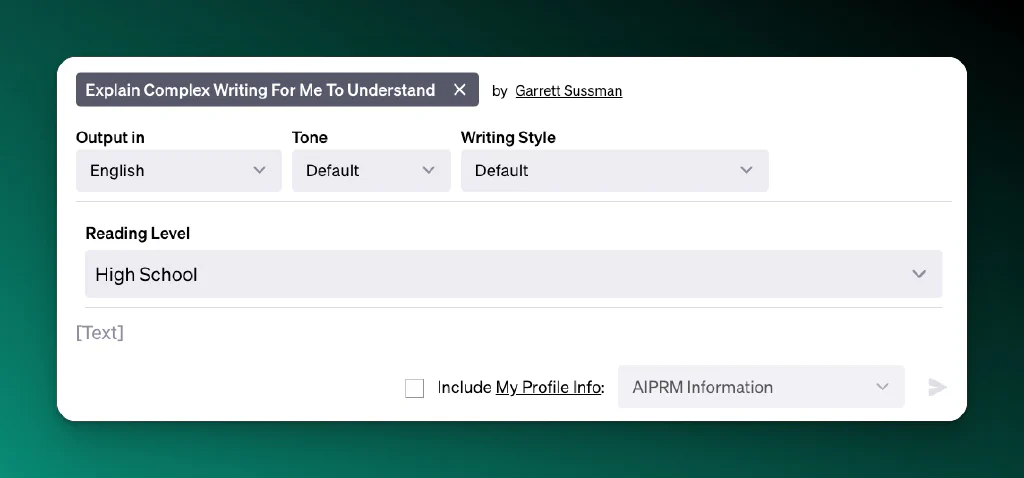
Take for instance this Wikipedia summary of the concept of General Relativity by Albert Einstein. While Wikipedia does a great job of breaking down complicated topics, it still relies on jargon and can be confusing.

What happens when we copy and paste this text into our prompt?

Doesn’t that make a lot more sense? If you’re drowning in PoliSci or philosophy texts, ChatGPT can bail you out.
ChatGPT can break down and simplify complex texts, making them easier to understand. By translating jargon and dense language into clear, accessible terms, it aids comprehension and ensures that users can grasp the core ideas without getting bogged down by unnecessary complexity.
General Relativity was never easier to understand.
Improving Ideation, Outlining, and Writing Skills #
ChatGPT serves as a multifaceted tool for college students aiming to refine their ideation, outlining, and writing skills. By providing instant feedback, it helps users brainstorm and develop diverse ideas, ensuring a broader perspective.
When outlining, students can harness ChatGPT to structure their thoughts more coherently, ensuring a logical flow to their arguments. Furthermore, for honing writing skills, it offers real-time corrections and suggestions on grammar, style, and content coherence, allowing students to learn from their mistakes and improve over time. In essence, ChatGPT acts as an always-available tutor, guiding students through the academic writing process.
AIPRM Prompt: Critical Thinking Brainstorm

Imagine that you’re assigned a paper in your Sociology 101 on course and you have decided to write a paper on “The Impact of Social Media on Interpersonal Relationships.”
Let’s see what the ChatGPT can produce when brainstorming how we can develop this topic for our paper.
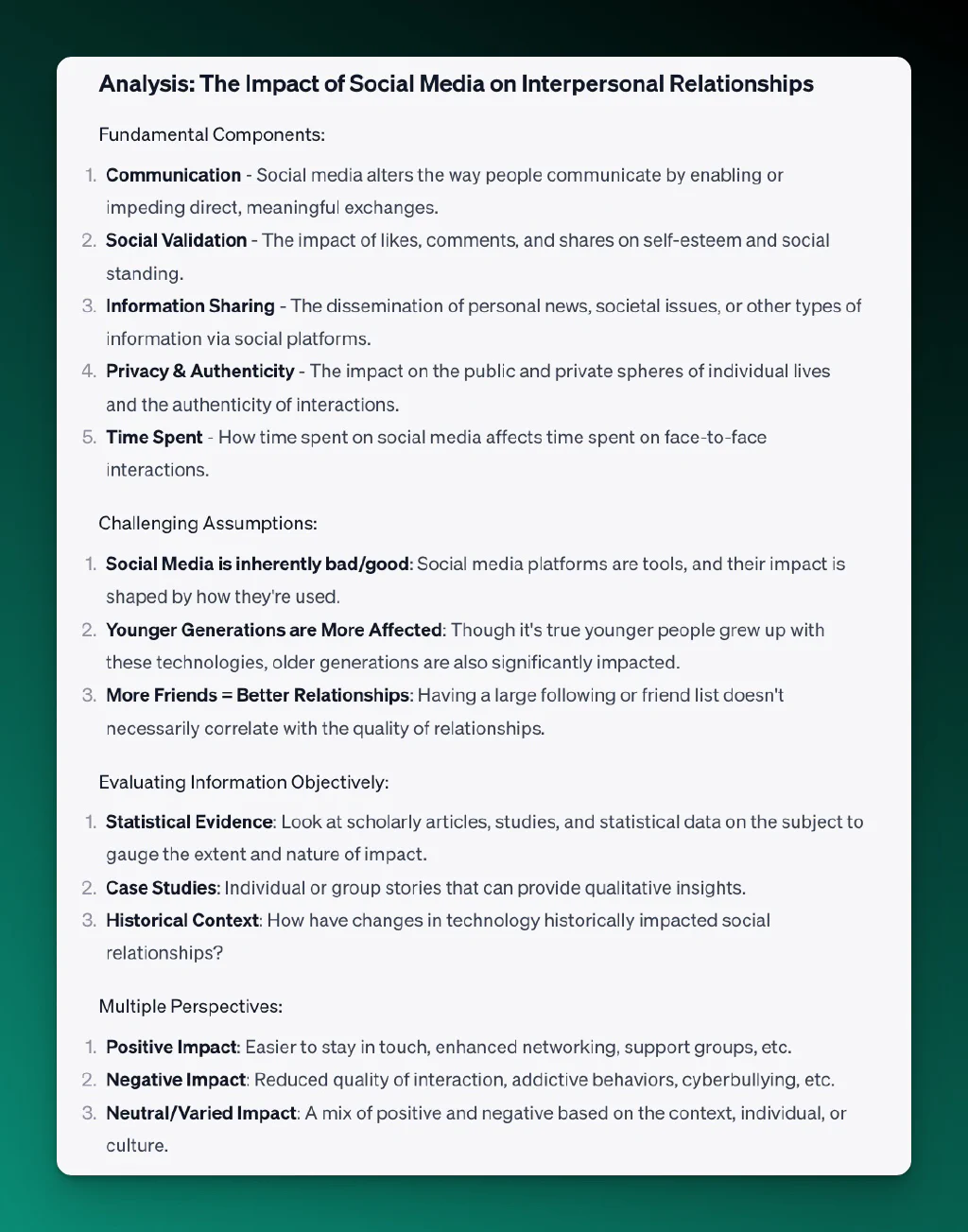
You can see how ChatGPT provides a range of different approaches to the topic from the fundamentals to the angles and perspectives that can inform the direction of the paper. And all of this is ideation, not actual content included in the writing.
ChatGPT goes on to provide solutions and invites you to continue the dialogue back and forth to flesh out the ideas for your Sociology paper.
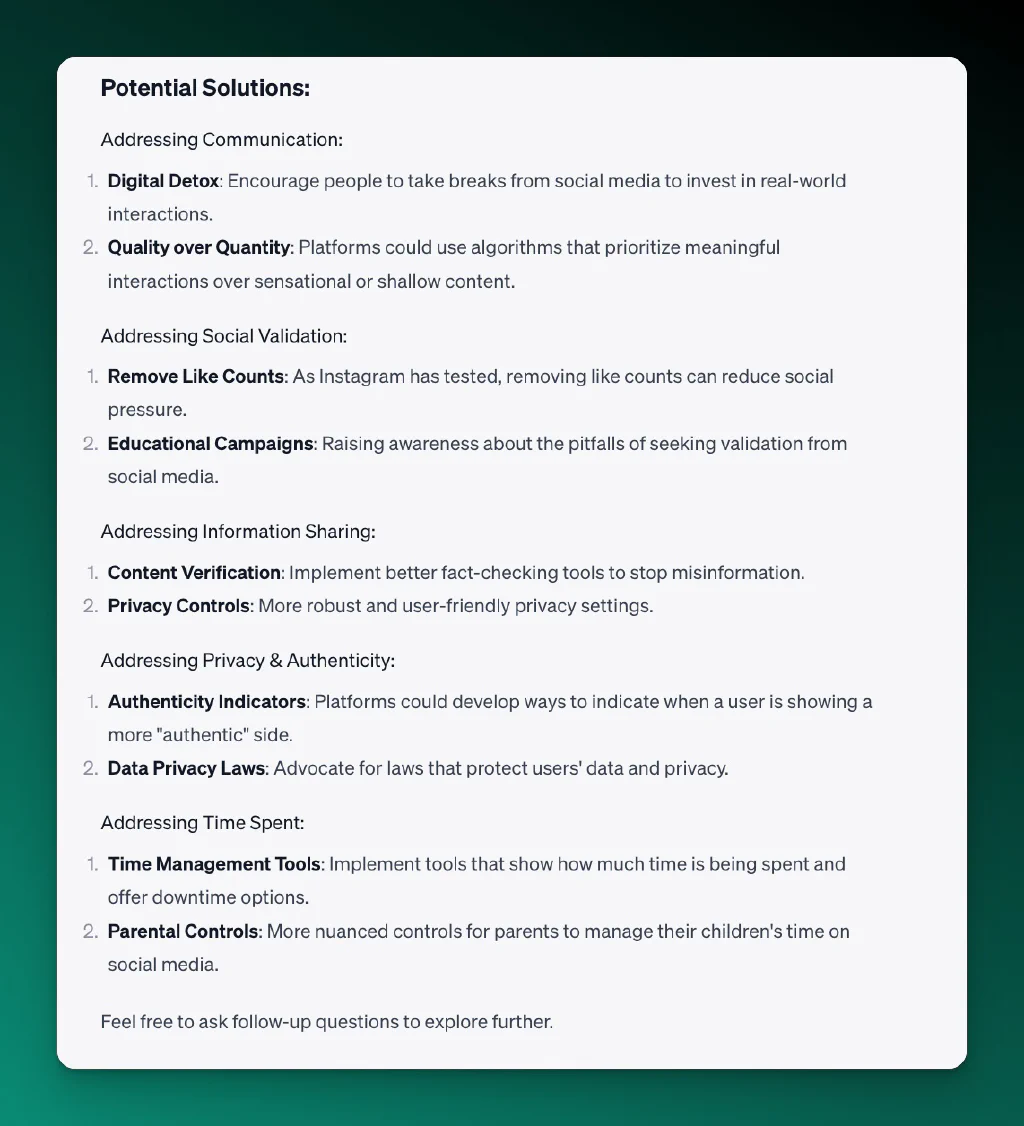
Outlining: ChatGPT can help students make a plan for their essays or projects. It’s that next step beyond topic idea development. You’re now taking the ideas and concepts that you’ve settled on and adding them to your writing process for outlining.
Just tell it your main ideas, and it’ll show you a good way to organize them.
AIPRM Prompt: Create an Outline for My Academic Paper
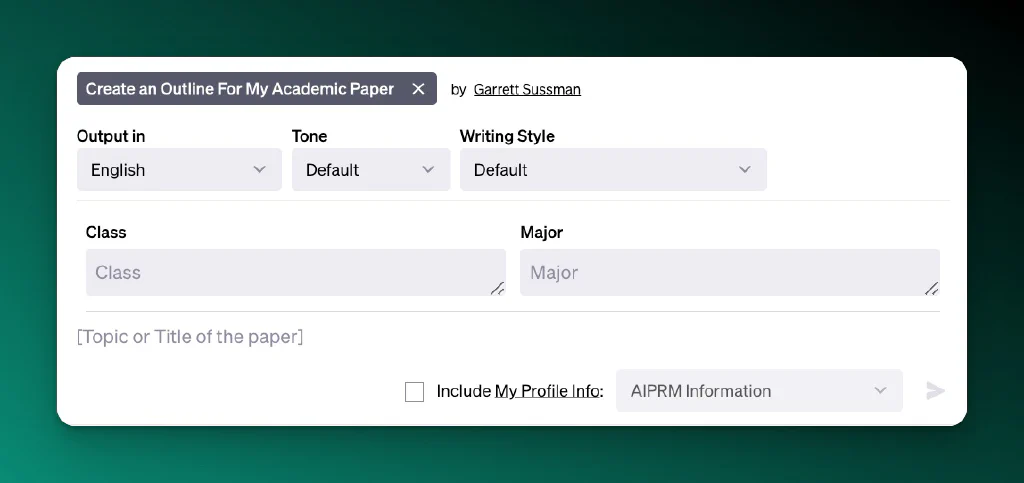
Let’s go in a different direction for our Psychology 101 class.
Input:
- Topic: The Role of Autobiographical Memory in Shaping Personal Narratives and Its Subsequent Influence on Identity Development
- Class: Cognitive Narratives & Identity Formation
- Major: Psychology
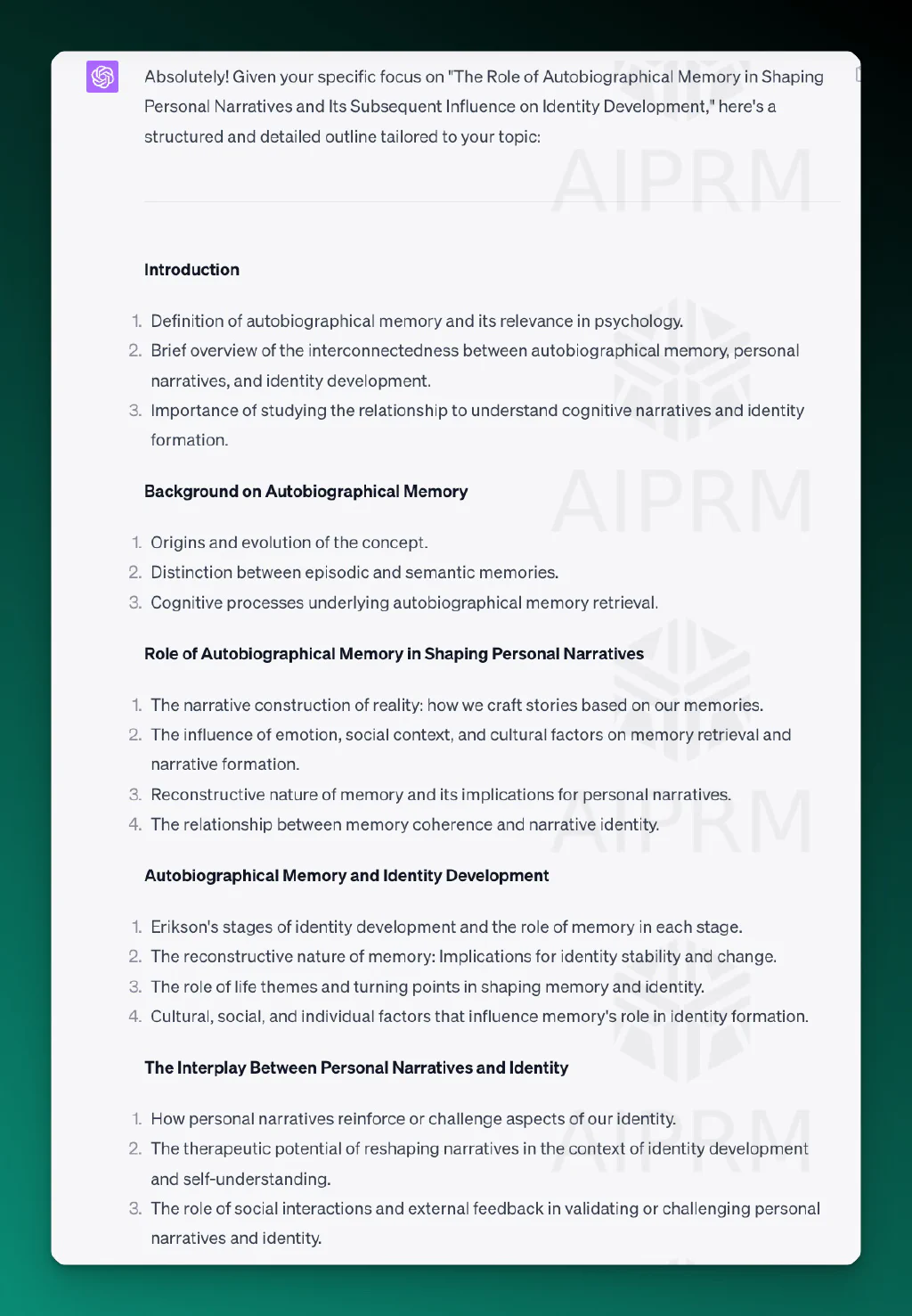
The outline is comprehensive.
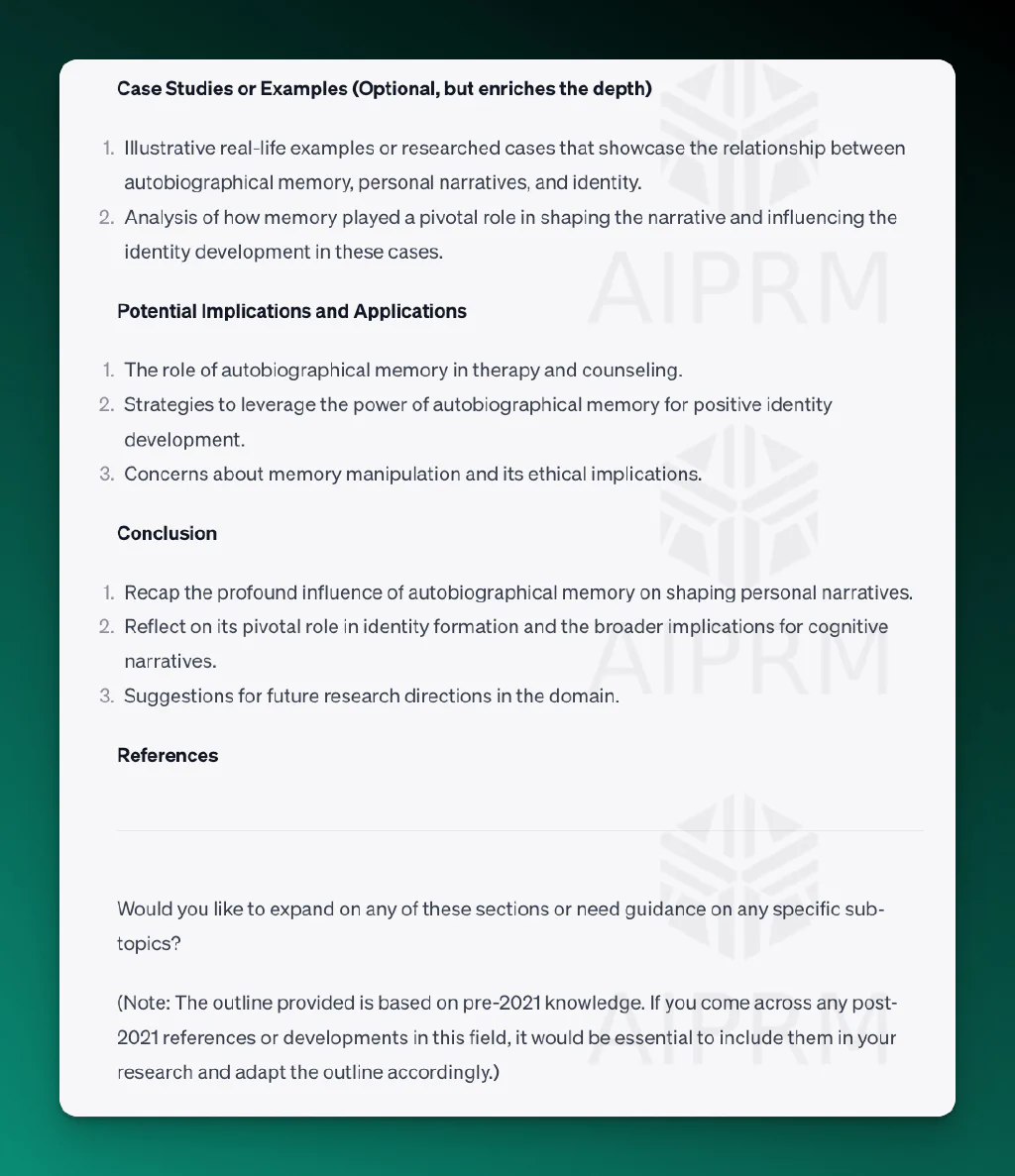
Again, ChatGPT asks if you want to expand on any of the sections. If you’ve performed the ideation prompt process first, you may have additional perspectives that you want in your outline. You can have ChatGPT rewrite your outline with those elements included.
What about writing the entire article?
AIPRM Prompt: v1.7 essay and thesis writer (study/university)

You can work with ChatGPT on the first draft of your article. It’s a great starting point. HOWEVER (all capital letters), you should never submit or publish AI-generated content that’s unedited.
Having ChatGPT complete an assignment for you is lazy and unethical. It’s an abuse of technology and frankly, it defeats the purpose of education.
Listen, we get that the tool can deliver writing that sounds perfect. Shoot, it might be better than what you can do at this point in your life.
It’s important to learn how to use these tools to make you more efficient, but it doesn’t replace people. You still need to learn how to communicate, think critically, and fulfill your responsibilities.
When you shortcut to this extent, you’re doing yourself a disservice.
So when you use a prompt like this, you still want to go through it with a fine-toothed comb. Add in your own voice, tone, thoughts, and expertise. Edit the sentences and ideas to come more from you.
Okay, we’ll get off of our soapbox.
Here’s the impressive output:
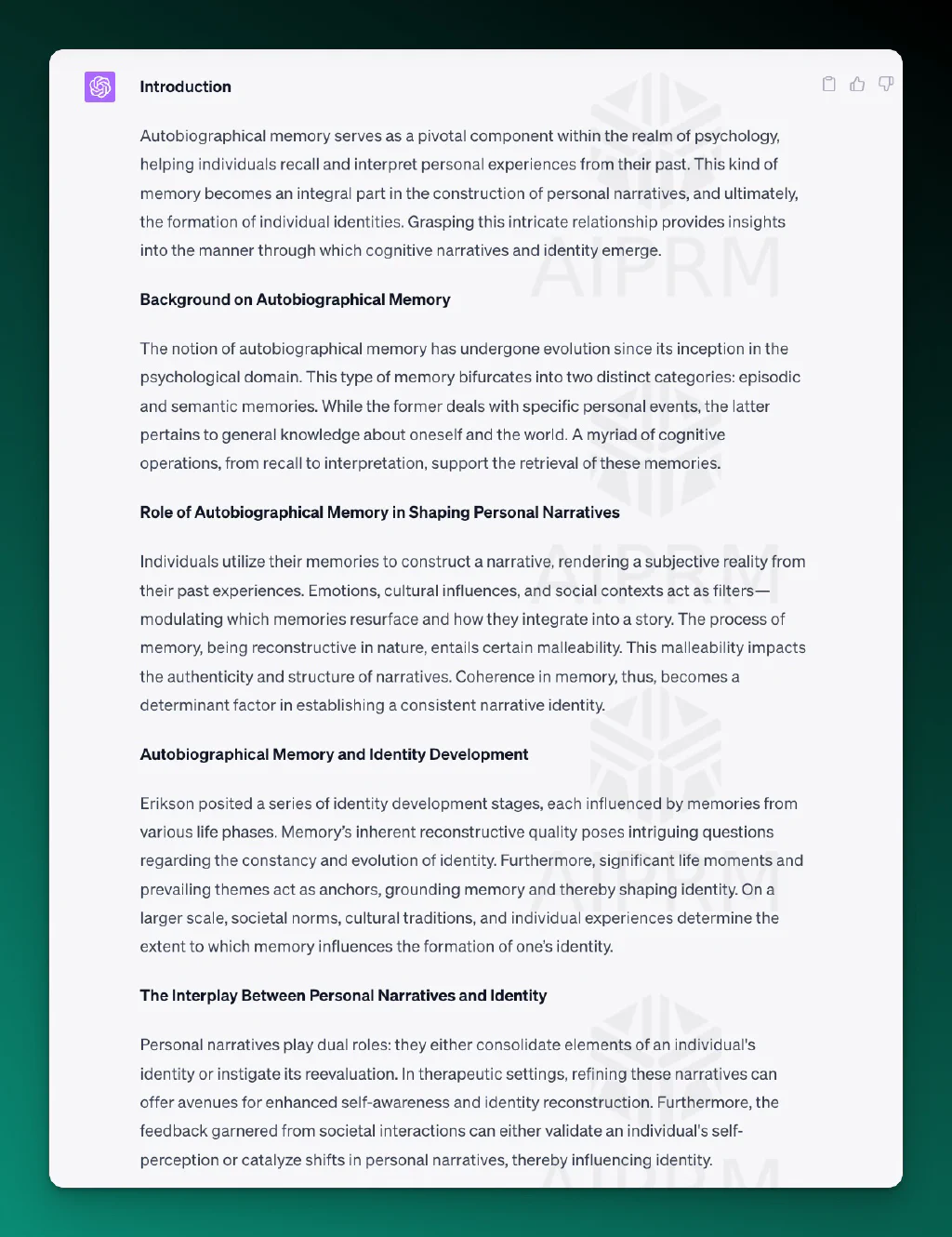
Writing Skills: ChatGPT can read what you’ve written and give suggestions to make it better. It’s like having a helper to check and help improve your work.
AIPRM Prompt: Complete Proofreading in One Click
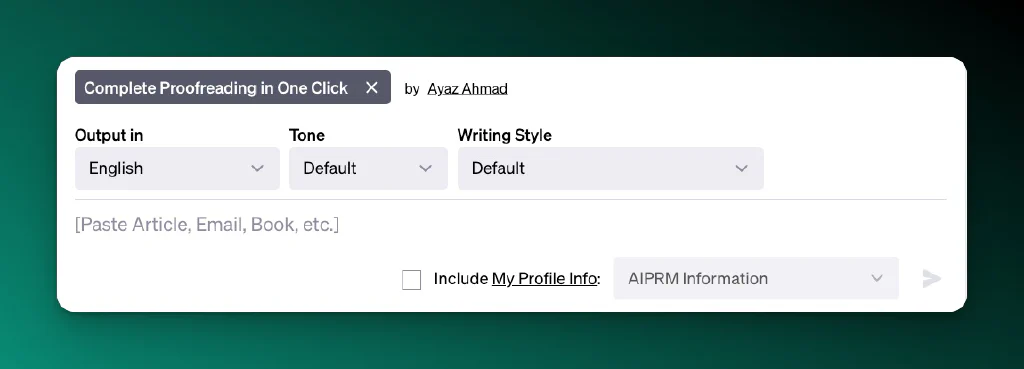
This prompt can take your writing and give it a thorough review as if proofread by a professional editor. The cool thing about the output is that it actually explains which elements were wrong and suggested fixes (as opposed to just fixing it for you.)
Let’s say you’re writing an article on Sea Turtles for Oceanography. Now, I know your writing isn’t this awful, but let’s use this embarrassing paragraph:
“Sea turtels is vital creature in oceonography study. They swim in ocean and helps in balencing the marine eco-system. There bodys is very adapt to the salty water and this helps oceonographers to understand about adaptashun in marine life. Their migration patter also interesting and teaches alot about current and temperatur changes in oceon. But sadly they are endagerd becuz of human activites like pollution and illegal hunting for they shells. Oceonographer can study these factors for better consevation strategies.”
CRINGE. Let’s see what the prompt can do.

Here’s how it corrects grammar mistakes:
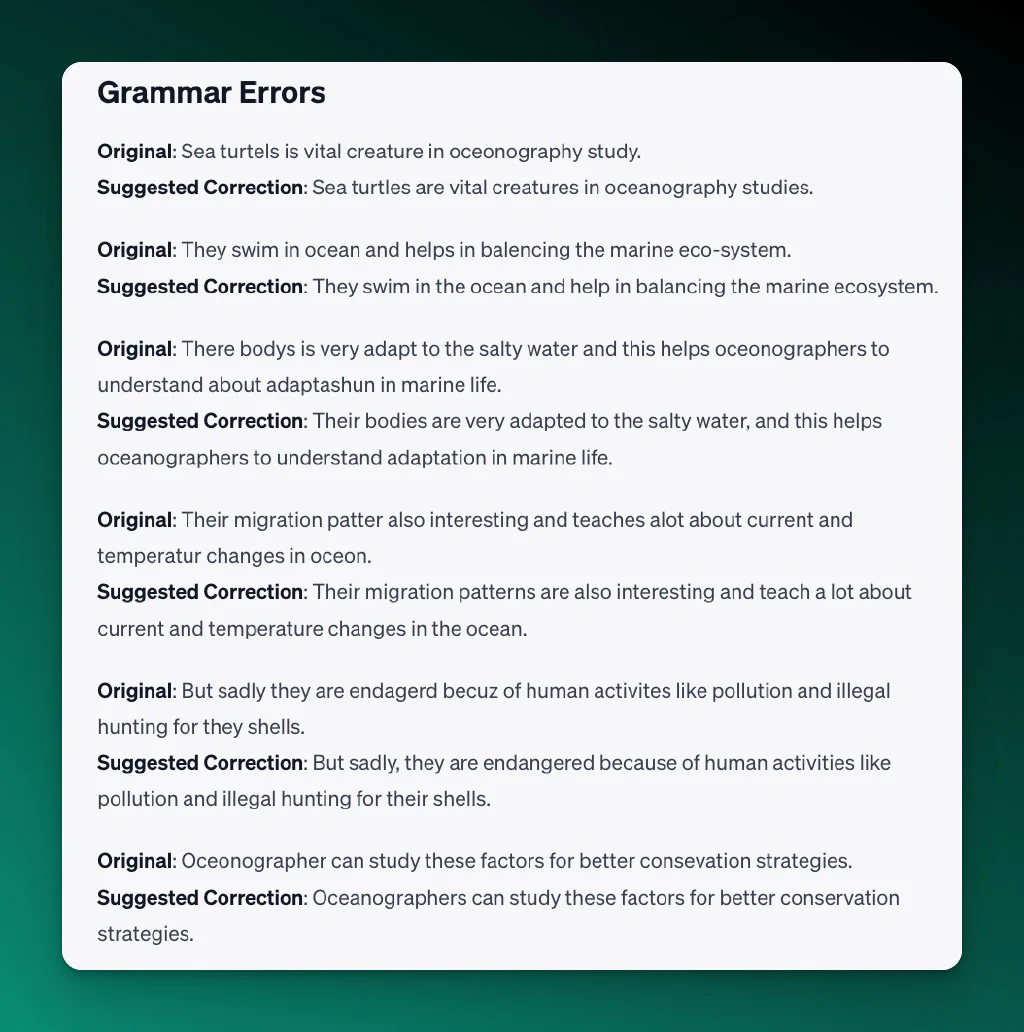
Additional Writing AIPRM Prompt: Improve Your Writing Skills
Planning Out Project Management for Assignments #
When it comes to managing your academic undergraduate projects, think of ChatGPT can help lay out a clear roadmap. You can feed in an overview or some key points about your project, and the tool can suggest a step-by-step workflow for you.
If you’re the unorganized type, how could you not leverage something that sets realistic deadlines and guides you on what to focus on first?
Basically, it’s like having an associate professor who helps you break down a complex project into smaller, more manageable tasks. It’s a great way to be more efficient with your time, reduce your stress levels, and ultimately, turn in a more polished assignment.
AIPRM Prompt: Create an Academic Project Roadmap
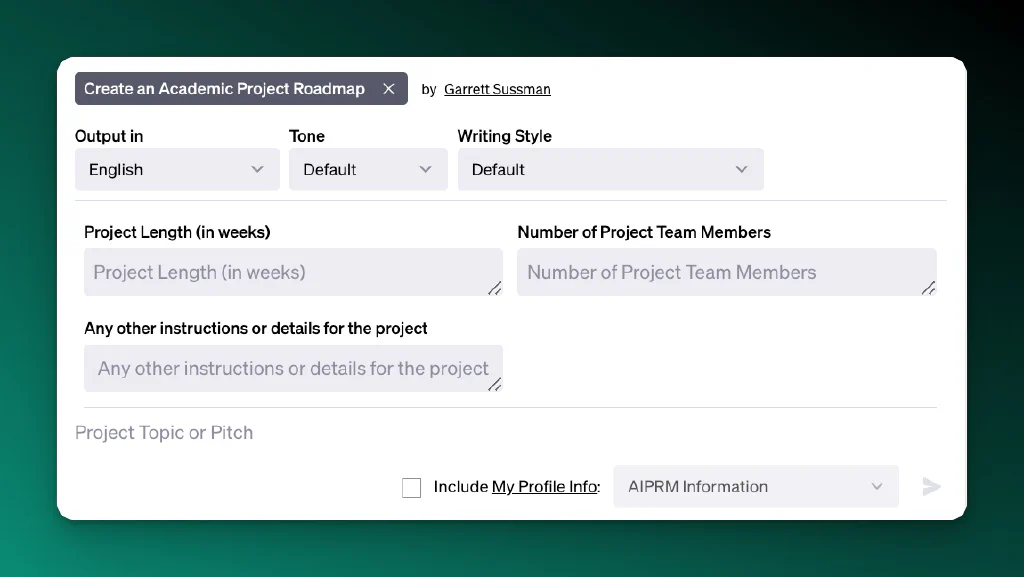
Imagine that you and 3 colleagues are conducting a 4-week project for your film class on the influence of soundtrack on audience emotion. It will be a Case Study of 2010s Superhero Films.
The assignment has the following objective, scope, and expected deliverables:
Objective:
To explore how soundtracks in superhero films from the 2010s influence audience emotion, with each team member focusing on one major film for in-depth analysis.
Scope:
- Each team member will select one superhero film from the 2010s to study.
- Analyze the correlation between specific musical themes and key emotional moments in the film.
- Conduct a brief online survey to gauge the audience’s emotional response to these musical themes.
Expected Deliverables:
- A joint written report of 10-15 pages that integrates the individual analyses and summarizes survey findings.
- A PowerPoint presentation outlining the project’s key insights and recommendations.
- Raw and analyzed data from the audience survey.
Let’s see what ChatGPT and this prompt will produce.
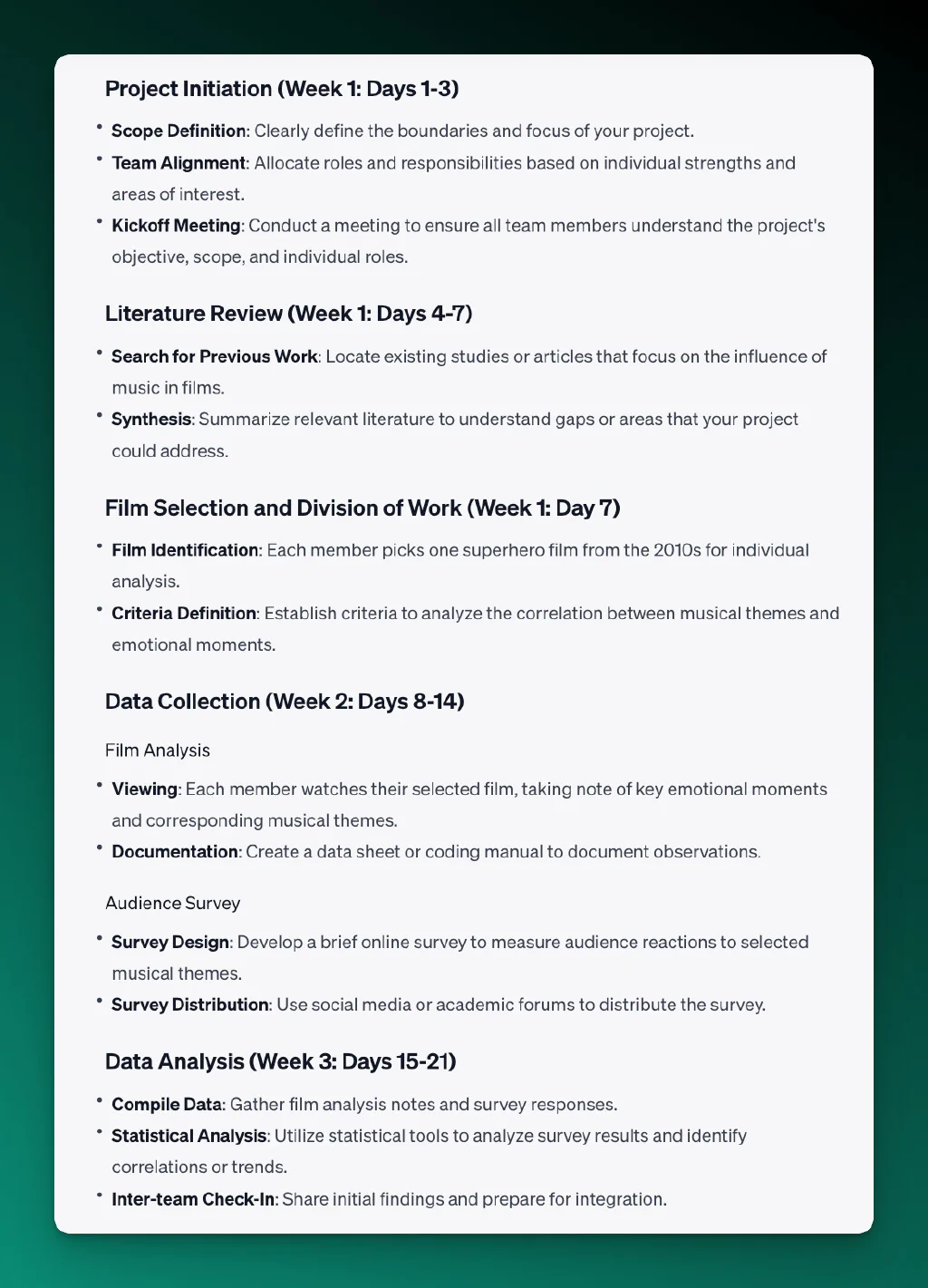
And then you get Week 4, Review, Milestones, and Tips.
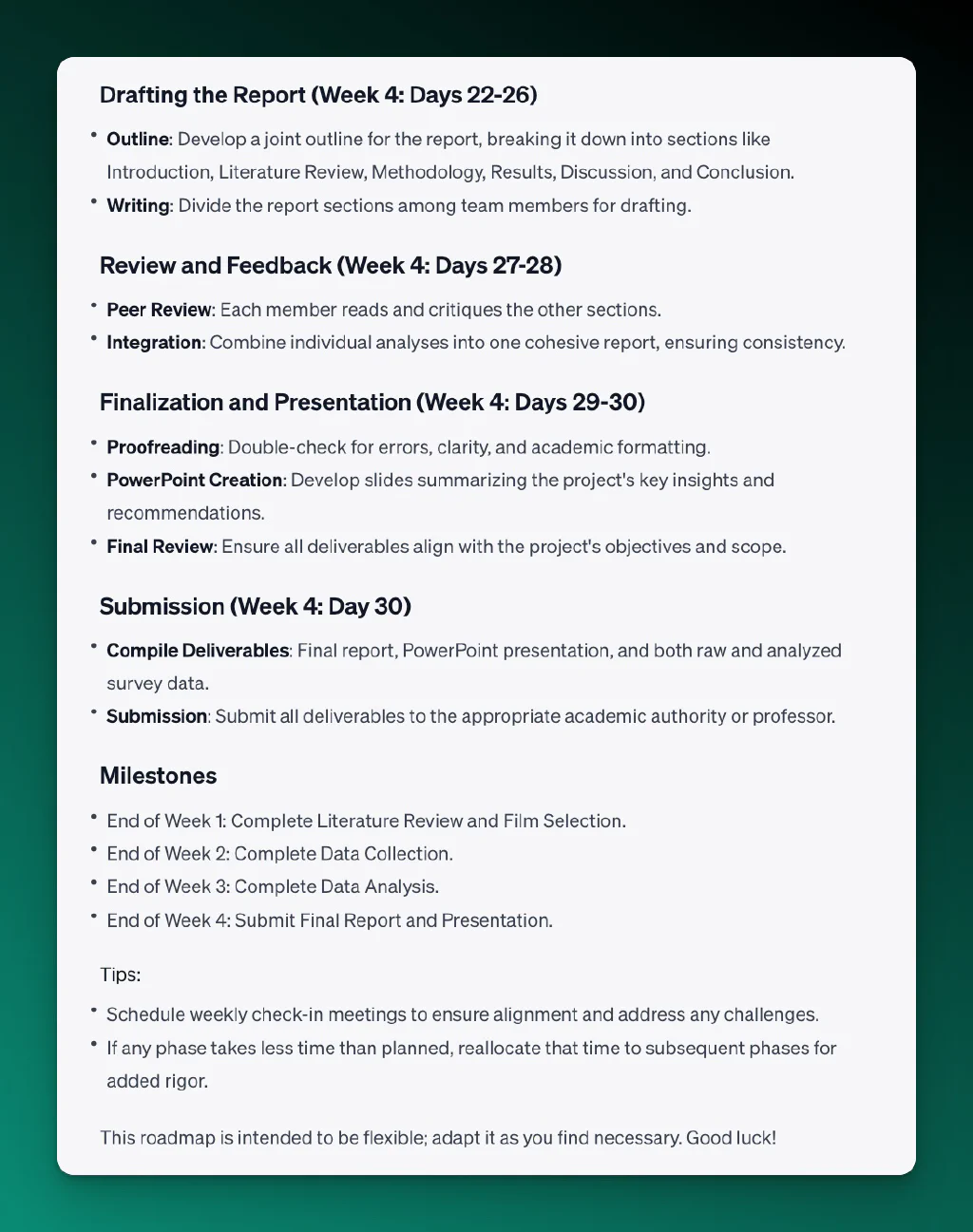
And this can be accomplished in minutes. Imagine how prepared you’ll feel executing this project with your colleagues when it’s all mapped out.
The beautiful thing with ChatGPT? It’s flexible, if you don’t like the output, add a constraint and ask it to rewrite the content.
Mock Interviews and Oral Exam Practice #
Some courses require a performance element in your studies. You might need to give a presentation or participate in a mock interview. You could work with a colleague or in front of a mirror, but ChatGPT is perfect for this use case.
ChatGPT can help you prepare by generating simulated questions and providing immediate feedback. Students can input lecture and class notes to receive contextually relevant questions, practice their responses in a simulated environment, and refine their understanding of the material.
The interactive nature of the platform allows for real-time adjustments, enabling students to focus on weak areas and build confidence before the actual assessment.
AIPRM Prompt: Create Study Guide From Lecture Notes
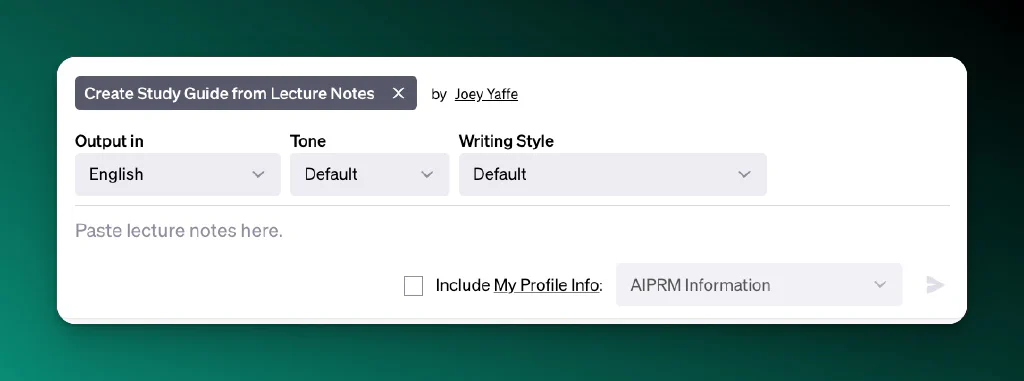
Imagine you’ve just sat through a comprehensive lecture on Egyptian Art History and you know there’s a test coming up. Here are our crappy notes from the lecture:
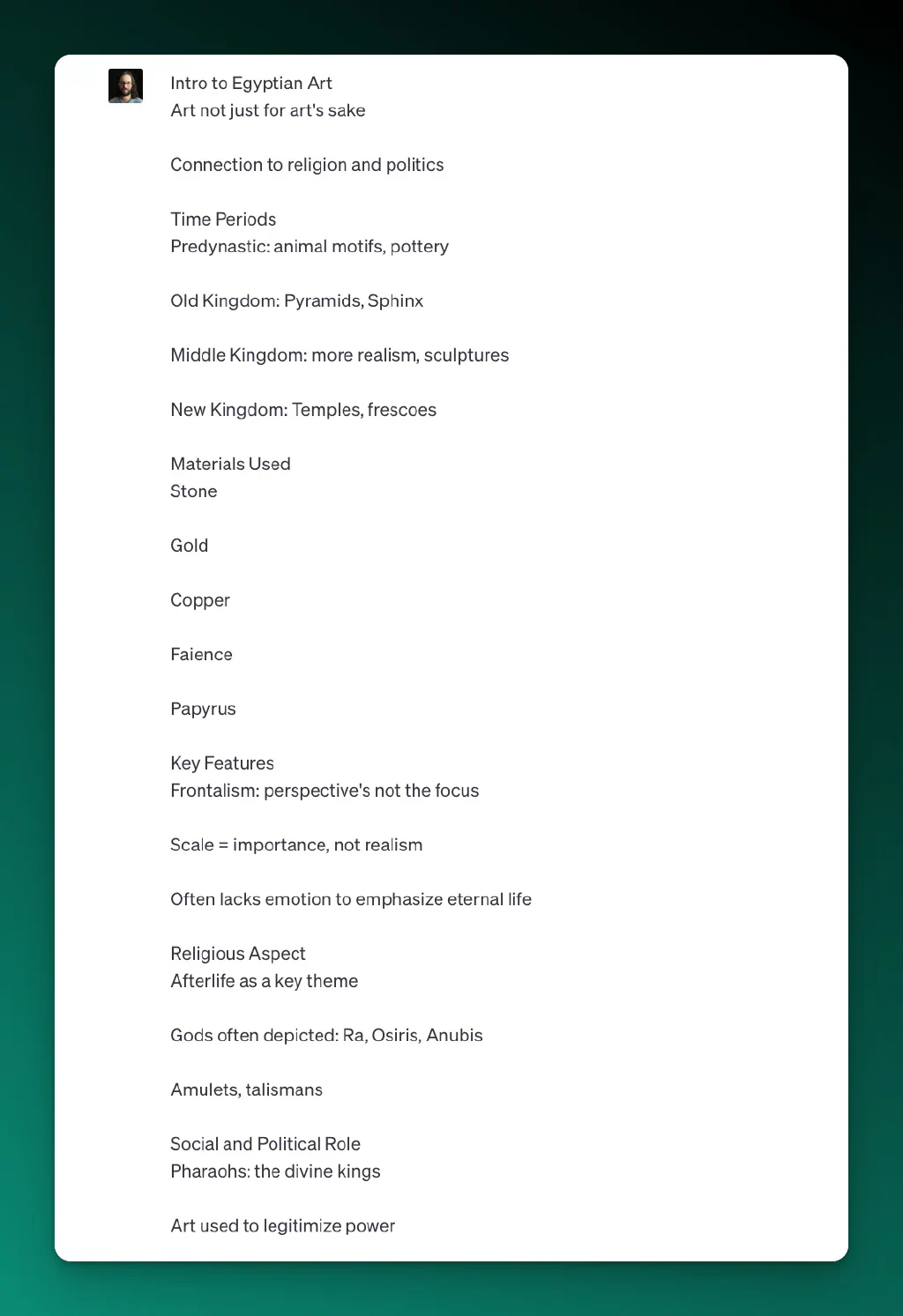
Check out this study guide that ChatGPT can produce from your unorganized notes.
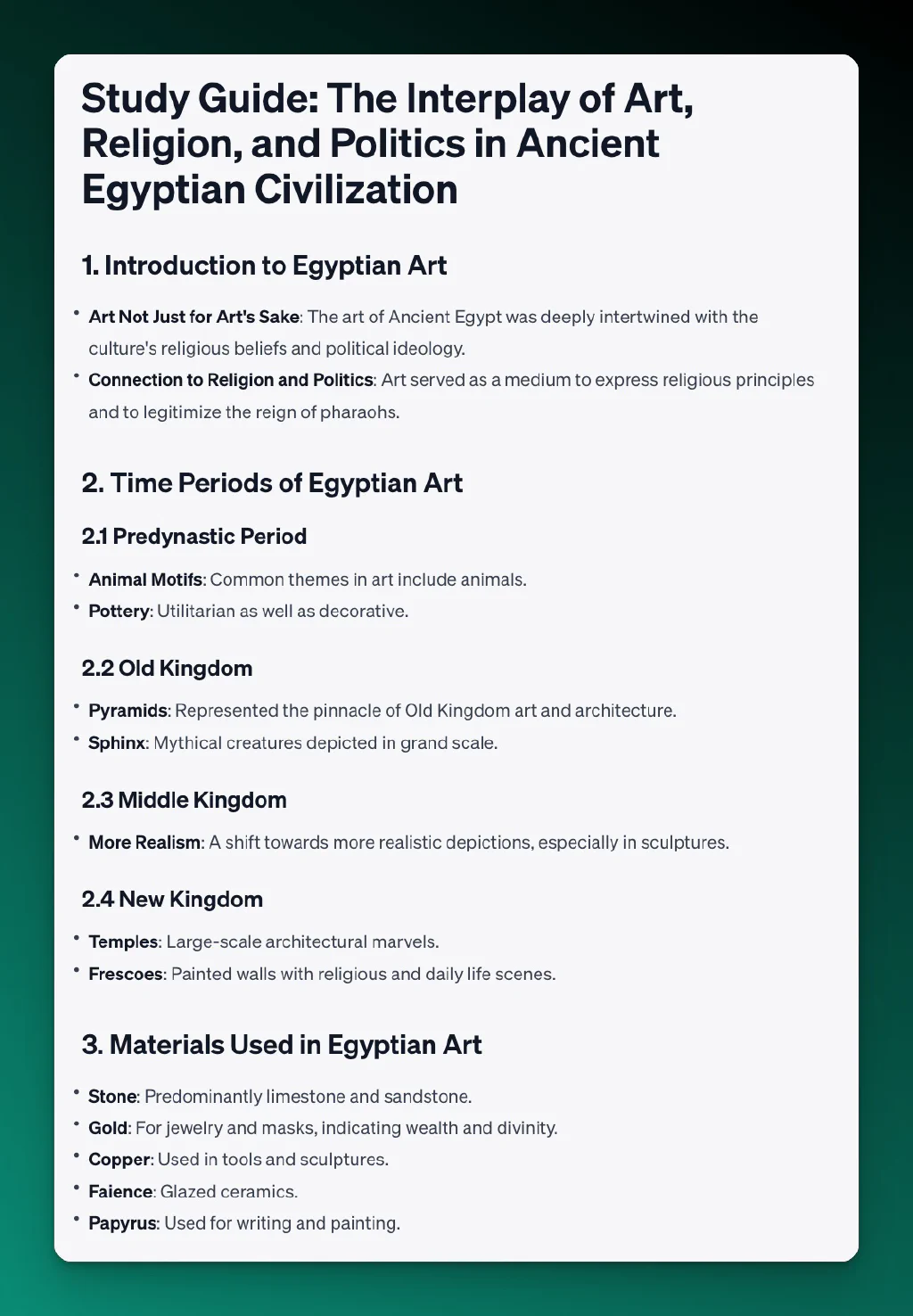
And then we get actual Key Terms and Key Questions:
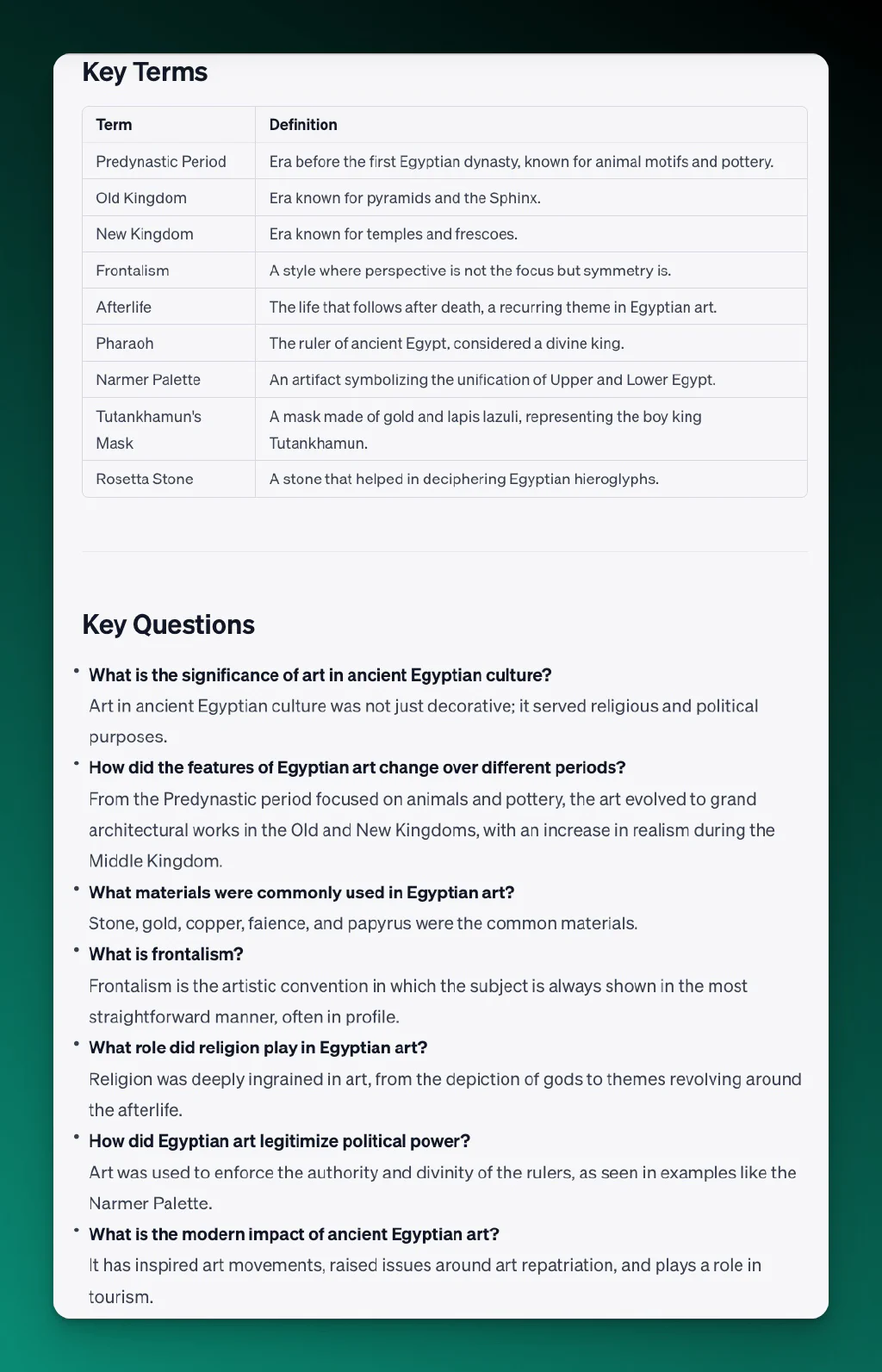
You could also take those notes and create a quiz.
AIPRM Prompt: Create Quiz from Lecture Notes
As you can see, ChatGPT can serve as a versatile tool for college students by generating comprehensive study guides that break down complex lecture notes into easily digestible sections, complete with key terms and possible questions for review.
The model can also create customized quizzes that test students on crucial course concepts, offering immediate feedback for better learning outcomes. Its ability to organize and synthesize information in a coherent manner makes it a valuable resource for effective study and exam preparation.
Safety and Ethics: Using ChatGPT Responsibly #
Understanding ChatGPT’s Limitations #
First off, know what ChatGPT can and can’t do. It’s a tool designed to assist with text-based tasks. While it’s powerful, it’s not foolproof. It can’t think critically or understand the nuances of your specific academic field.
Avoid over-reliance on the tool. Remember, ChatGPT should be an aid, not a substitute for your own thought process and academic skill set.
Ensuring Academic Integrity #
No discussion about using ChatGPT for schoolwork is complete without mentioning academic integrity. Always cite your sources and don’t pass off generated text as your own original work. Understand the difference between assistance and plagiarism.
Use ChatGPT as a tool, not a crutch. It can help brainstorm ideas or outline a paper, but the heavy lifting—critical thinking, data analysis, and detailed research—still falls on you.
Future of AI in Education #
The Growing Role of AI in Classrooms #
Looking forward, AI is set to play an increasingly important role in educational settings. In the next decade, we might see AI-driven systems that can grade assignments, or even tailor educational content to individual student needs.
Anticipate potential shifts in traditional learning environments. As AI tools like ChatGPT become more prevalent, the teacher’s role might shift from that of an information provider to more of a mentor.
ChatGPT and Beyond: Other AI Innovations #
ChatGPT is just the tip of the iceberg. Other AI tools, from automated grading systems to AI-driven research databases, are also making a mark. These tools collectively raise the bar in educational technology, providing more targeted and efficient ways to learn.
ChatGPT sets the bar by offering a well-rounded, text-based assistant that can tackle a wide array of tasks, making it a versatile tool in an ever-evolving educational landscape.
Use ChatGPT Responsibly, But Learn to Use ChatGPT #
ChatGPT and similar technologies are transforming how we approach education. American educational institutions have traditionally lacked teaching us important life skills. Too many students never learn financial literacy. They don’t know how to use credit cards responsibly or balance their budget.
AI literacy is the same thing. You need to understand how to use AI tools in real life. It’s unavoidable. It’s like trying to go through college without a smartphone.
These tools are not meant to replace human intelligence but to augment it. Embrace the possibilities but remember to use them responsibly.
Your education is a journey. Stay curious and don’t be afraid to leverage technology as you navigate through it.
Frequently Asked Questions (FAQs) #
How do I get started with ChatGPT for my studies?
Simply sign up on the OpenAI website and follow the instructions to begin using ChatGPT.
Can ChatGPT help me with subjects outside of STEM?
Absolutely, ChatGPT can assist with a wide range of subjects including arts, social sciences, and humanities.
Is it ethical to use ChatGPT for my assignments?
Using ChatGPT is ethical as long as you adhere to your institution’s policies on academic integrity and plagiarism.
Are there any risks or limitations in relying on ChatGPT?
The main limitations are its inability to think critically and the risk of over-reliance. Always double-check the information and use it as a supplementary tool.
How can educators use ChatGPT in the classroom setting?
Educators can integrate ChatGPT into the classroom as a teaching aid, for tasks like generating discussion questions or helping to outline lesson plans.
How do I get started with ChatGPT for my studies?
Simply sign up on the OpenAI website and follow the instructions to begin using ChatGPT.
Can ChatGPT help me with subjects outside of STEM?
Absolutely, ChatGPT can assist with a wide range of subjects including arts, social sciences, and humanities.
Is it ethical to use ChatGPT for my assignments?
Using ChatGPT is ethical as long as you adhere to your institution’s policies on academic integrity and plagiarism.
Are there any risks or limitations in relying on ChatGPT?
The main limitations are its inability to think critically and the risk of over-reliance. Always double-check the information and use it as a supplementary tool.
How can educators use ChatGPT in the classroom setting?
Educators can integrate ChatGPT into the classroom as a teaching aid, for tasks like generating discussion questions or helping to outline lesson plans.
Feel empowered, but always exercise responsibility when using ChatGPT for your academic needs. Want to build your own prompts, use the AIPRM prompt library, and give yourself a considerable educational advantage? Install AIPRM for Free and start prompting like a professional.
Table of Contents
Use the Cheat Code for AI today. Install AIPRM for free.
Just a few clicks away from experiencing the AIPRM-moment in your AI usage!
Popular AI Prompts
Craft Detailed Paragraphs from Response Keywords
Improve PromptsTransform Keywords into Rich, Elaborate, and Refined Paragraphs
Recipe Writing
Writing PromptsCraft a recipe with detailed instructions
REI Daily Activity Calendar
Plan PromptsGenerate your personalised daily to-do calendar for REI activities
Articles with 100% Perfect Readability
Writing PromptsCraft flawless articles with optimal readability and enhance them …
As Seen On


Computer Woche DE


Upwork


Zapier


Seeking Alpha


Liverpool Echo UK


Daily Record UK


Mirror UK


ZDNet DE


The US Sun
What Our Users Say
AIPRM is a vital part of our workflow
"We are using AIPRM to rebuild our Blackfishdistillery.com online presence quickly went from a curiosity to a vital part of our workflow. Having a research assistant like AIPRM to out line ideas really cured the staring at a blank page problem!”

Surprising and radically useful
"I am surprised with this extension, it is new, surprising and radically useful”

Transformative AIPRM: A Must-Have for Idea Enthusiasts Using ChatGPT!.
"This is the most beneficial app to install if you’re an idea guy like me who uses ChatGPT. I absolutely love it”



